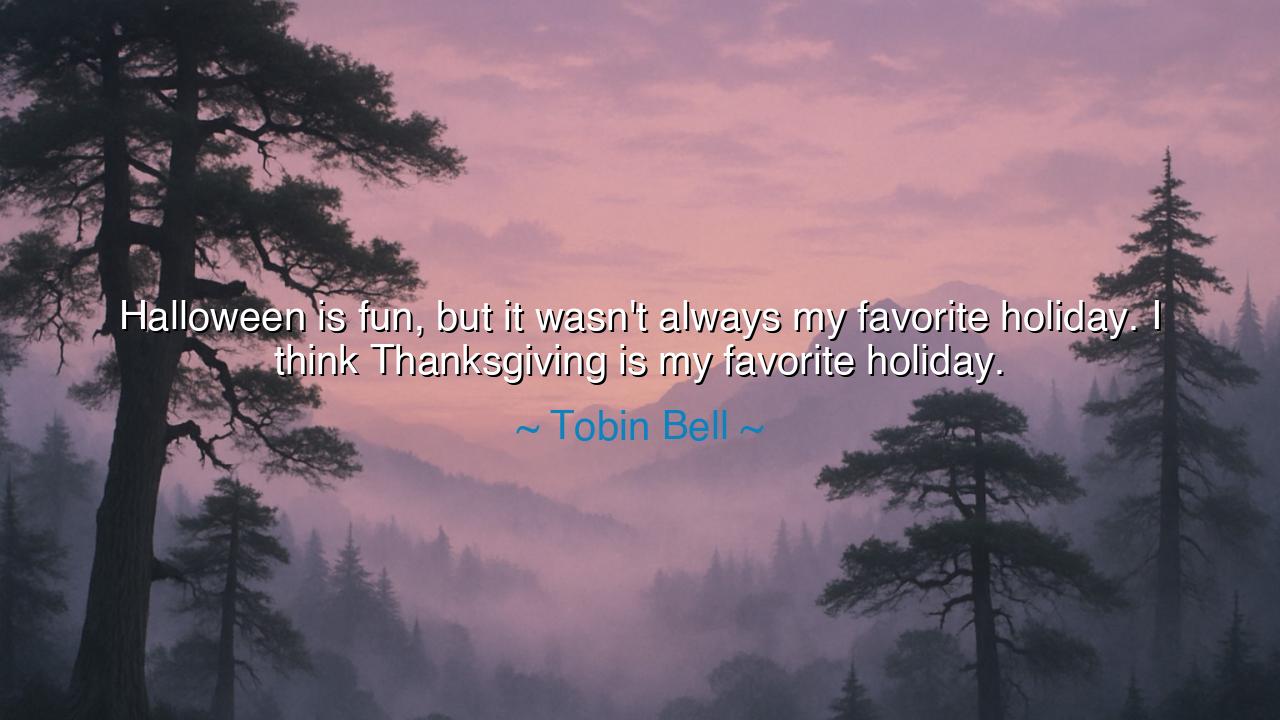
Halloween is fun, but it wasn't always my favorite holiday. I
Halloween is fun, but it wasn't always my favorite holiday. I think Thanksgiving is my favorite holiday.






Tobin Bell, with simplicity yet great depth, once reflected: “Halloween is fun, but it wasn’t always my favorite holiday. I think Thanksgiving is my favorite holiday.” In these words, we find not only a personal preference, but also the contrast between two kinds of celebration—one of masks and play, the other of gratitude and gathering. He acknowledges the joy of Halloween, a festival of imagination, disguise, and merriment, yet places his heart with Thanksgiving, a feast of remembrance, family, and thankfulness. Thus, in his statement lies a teaching on the journey of the soul: that as we mature, our hearts often turn from surface delights to deeper forms of joy.
The origin of this contrast reaches back to the ancient roots of these holidays. Halloween, born of Celtic harvest rites and All Hallows’ Eve, was a festival of shadows—of costumes, games, and warding off spirits. It delights in play, in the thrill of mystery and transformation. Thanksgiving, however, finds its origin in the gathering of harvest, in the gratitude of survival, and in the communion of families joined around the table. It is quieter but weightier, a holiday not of masks but of faces unveiled, not of fright but of remembrance. Bell, by naming his preference, speaks to this timeless truth: that joy which is rooted in gratitude outshines joy which is fleeting.
History itself affirms this lesson. Consider the Pilgrims of 1621, who after hardship and famine, joined with the Wampanoag people to share the bounty of the land. Their Thanksgiving was not merely a feast, but an offering of humility and gratitude to God and to their neighbors. Contrast this with the festivals of masquerade and carnival that have existed in many cultures: joyous, colorful, but often fleeting in their meaning. Bell’s reflection, then, is the voice of one who sees that the heart craves more than costume—it longs for connection and gratitude.
The deeper meaning of his words speaks also to the stages of human life. In youth, we are enchanted by Halloween, by the thrill of dress, candy, and adventure. But with age, our hearts turn to the table of Thanksgiving, where family gathers, where memory is honored, and where gratitude becomes the sustaining feast. What once entertained us loses its central place, while what roots us—love, family, gratitude—becomes our treasure. Thus, Bell’s statement is not only about holidays, but about the evolution of human longing.
There are countless real-life examples of this transition. Soldiers abroad during times of war often wrote that what they missed most was not the revelry of festivals but the Thanksgiving table back home, the sight of family gathered in peace. Abraham Lincoln, in 1863, declared Thanksgiving a national holiday not in a time of ease, but in the midst of civil war, believing that gratitude—even in hardship—was the anchor that could unify a divided nation. In these examples, we see why Thanksgiving rises above all other feasts: it teaches us to give thanks even when life is not easy.
The lesson for future generations is clear: fun is fleeting, but gratitude endures. Halloween, with its costumes and games, has its place—it is the playfulness of the human spirit, the laughter that lightens life’s weight. But Thanksgiving holds the power to sustain, to remind us of what is eternal. It anchors us in family, in memory, and in the sacred act of giving thanks for life itself.
Practical wisdom flows from Bell’s reflection: celebrate both joy and gratitude, but let gratitude be your guide. Enjoy the fun of Halloween, but do not let the masks blind you to the greater feast. When Thanksgiving comes, open your home, gather your family, feed the hungry, and give thanks for blessings both great and small. Teach your children that true celebration is not only in laughter, but also in remembrance and gratitude.
Thus, Tobin Bell’s words, though spoken lightly, become a torch of ancient wisdom. The spirit of Thanksgiving is greater than the spirit of masquerade. To give thanks is to rise above the fleeting pleasures of disguise and to rest in the eternal joy of gratitude. Let this truth be carried forward: that the greatest holiday is not the one of masks, but the one of open hearts, gathered hands, and voices lifted in thanksgiving.






AAdministratorAdministrator
Welcome, honored guests. Please leave a comment, we will respond soon